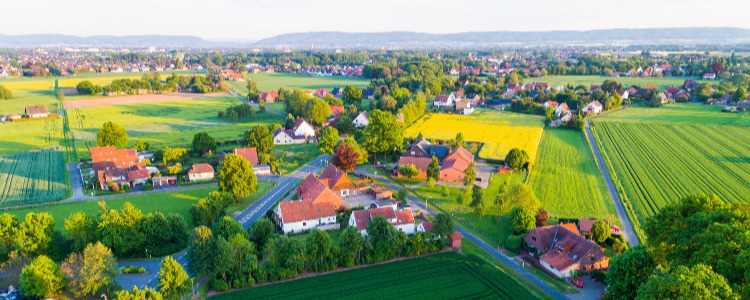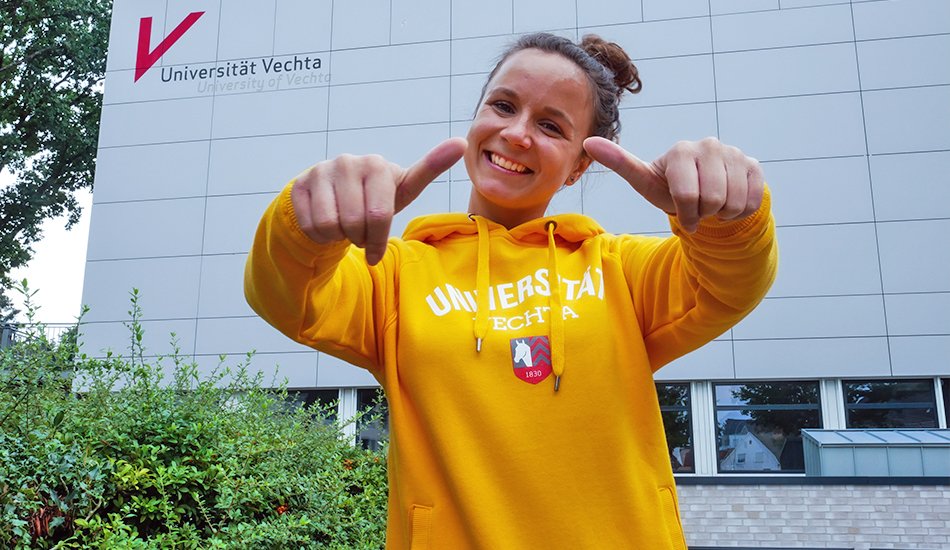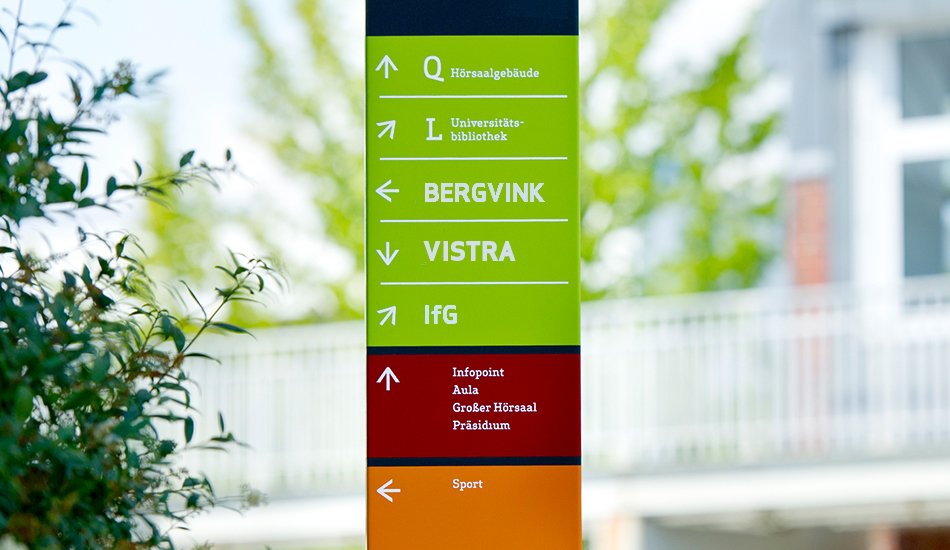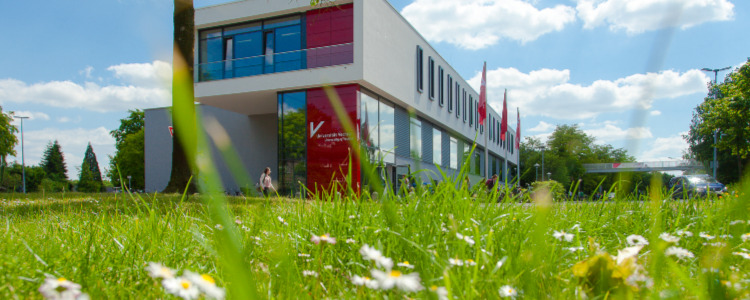The University of Vechta: looking to the future, shaping the change
By closely intermeshing research, teaching and transfer in these areas, the University of Vechta will contribute to empowering future generations to tackle complex tasks against a backdrop of major social challenges. Our significant long-standing expertise in teaching- learning research can be used to translate skills shortages identified through profession and inclusivity research and transformation research into educational concepts for young people. With our interdisciplinary/ transdisciplinary approach to transformation research and specific focus on the needs of rural areas in a globalised world, this is an area where the University of Vechta boasts a unique selling point.
The conscious interlinking of research focus areas enables us to take a versatile, in-depth approach to tackling research topics and enables a holistic perspective using innovative approaches. This in turn enables us to better meet the requirements imposed by the complex world we live in today. Social, educational and societal processes will be studied through interdisciplinary collaboration. Research will address social inclusivity across all the different stages of human life, the shaping of sustainable transformation processes and teaching and learning in a heterogeneous, digital world. The aim is to empower people to participate in society to the maximum possible extent.
The previous University Development Plan defined agriculture and food, and cultural studies as profile focus areas. In this plan, these focus areas are primarily integrated into the transformation research and profession and inclusivity research profile focus areas.
Profile focus areas of the University of Vechta

Teaching-learning research: Designing the school of the future
For nearly 200 years, teacher training at the University of Vechta and its predecessor institutions has been a byword for quality and a central pillar of teacher training in Lower Saxony. In the profile focus area of teaching-learning research, research will be carried out into the school of the future, and a close look will be taken at educational and interaction processes, and classroom teaching.

Profession and inclusivity research: Boosting competence, increasing social inclusion
The profile focus area of profession and inclusivity research combines research on inclusion, professionalisation processes, occupations and professions. It covers social inclusion through different life stages, social justice and the development of an inclusive society. Interdisciplinary teams at the University of Vechta employ advanced research methods to conduct research on social innovations.

Transformation research: Capturing dimensions and shaping in partnership
The transformation research profile focus area will involve research into processes of transformation towards a more sustainable society. With a focus on the Agenda 2030 sustainability goals, transformation research at Vechta will focus in particular on transformation processes in rural areas and education for sustainable development. Together with regional partners, the University will develop solution and action concepts for sustainable, socially viable development of the region and beyond.
More about the profile focus areas
With our strong focus on teacher training, teaching-learning research is a core profile focus area for the University of Vechta. Designing the school of the future is an education policy challenge. The University is determined to make a contribution to meeting this challenge and to ensure that students are adequately prepared for this future. The teaching-learning research profile focus area combines the subject matter of academic and subject didactic disciplines and education studies and educational psychology with education, learning, school and classroom teaching research. In addition, the University also looks at structural topics such as school development, alternative routes of entry to the profession, and a teacher training system in which prospective teachers are divided into primary, lower secondary and upper secondary school levels (Stufenlehramt). The University is actively involved in shaping these topics in alignment with the State University Development Plan (Landeshochschulplanung).
In a diverse society and diverse school environment, teaching-learning research makes a theoretical and empirical contribution to analysing and improving schools. Insights are gained into the educational processes and progress of children and adolescents and into the organisational prerequisites for these processes and progress. Priorities within this profile focus area include fundamental questions about child and adolescent learning processes, innovative teaching concepts, teaching methods and teaching materials, and issues relating to the professionalisation of teaching and interactions between teachers and the student body.
Conscious of social tensions around heterogeneity and inclusion, researchers at the University are developing groundbreaking perspectives for the development of an inclusive school system. Over the next few years, the Education, Upbringing, Society: Vechta Institute for Inclusion (BERGVINK) research institute will take the lead role in researching the topic and mission of inclusion, with a particular focus on inclusion in schools.
The teaching-learning research perspectives listed below link to and intersect with the profession and inclusivity research profile focus area in a variety of ways. Through the measures described, each of these perspectives generates important ideas and inspirations for the University and delivers significant research-based insights for designing the inclusive school of the future.
Heterogeneity, inclusion and adaptivity
The inclusive school of the future has to be viewed in the context of the increasing diversity of society and therefore of the student body. Inclusivity research is therefore concerned with various professional forms of individualisation and differentiation. For teachers, meeting learners’ individual needs and requirements and flexibly adapting the learning environment to suit individual interests, abilities and progress is becoming more and more important. In this light, research that deals with increasing and wide-ranging diversity in a school context is particularly helpful in showing the way forward. This is an area where questions about adaptability, learning difficulties, language ability and multilingualism, categorisation and stereotyping, the context of migration and flight, and collaboration in multi-profession teams and for full day schooling (German schools have traditionally been morning only) also play an important role. By hosting diverse learning groups, primary schools in particular, but secondary schools too, offer many research perspectives. The focus is on promoting child and adolescent learning and development processes, perspectives and expectations. Research will also address the question of how teachers need to be trained to enable them to design appropriate learning environments and opportunities in schools and in the classroom, and to create conditions conducive to effective learning processes for all students. The University contributes to enabling the realisation and exploitation of potential, in particular potential offered by interdisciplinary approaches in the additional profile focus area of profession and inclusivity research. This applies in particular to the potential offered by digitalisation.
Classroom teaching research
The University is shaping the school of the future both through research into subject didactics and through interdisciplinary research into classroom teaching. This involves exploring subject and general didactic, and educational psychology questions in areas such as subject-specific teaching methods, the design of learning processes, building skills and promoting skills development, the role of teachers, textbook research, digital teaching and learning media, and the opportunities offered by digitalisation in a school context. Firmly rooted in the region, one of the University’s particular strengths is researching non-school learning settings in the context of teaching intended to reflect lived experience.
Teaching and learning in a digital world
In recent years, the expectations placed on teachers and requirements profiles for teachers with respect to digital skills have become much more demanding. Against this backdrop, the University is exploring approaches to designing integrative media education provision, how teachers can recognise and use the didactic potential of digital media for lesson planning (including inclusive lesson planning) and school development, and in what contexts it is appropriate to use digital media in practice. Further examples from the teaching and learning research field include the highly topical issues of how to deal with disinformation and of artificial intelligence in an educational context. In this respect collaboration with Medienkompetenzzentrum Vechta (Media Literacy Centre Vechta) is an important point of departure for interdisciplinary research projects.
Education for sustainable development
The school of the future will be a place that views education as a good that empowers mindsets and behaviours that are fit for the future. Researching and promoting the acquisition of the skills of tomorrow will help teachers and students to ably participate in current and future processes for shaping society and to be confident in dealing with uncertainty and multiperspectivity. Potential education for sustainable development fields of research which specifically impact on the profile of the University in the rural area are skills models, teaching skills, use of innovative methods, teaching material design, management and institutionalisation, and governance and transfer research.
Research in the profession and inclusivity research profile focus area is conducted by researchers from a variety of disciplines. The quality of inclusion in a society depends on the professions and their adherents. This profile focus area contributes to extending our understanding of occupations, professions and inclusion. It focuses on empowerment and inclusion at all stages of life and on social justice as a whole. Key players in this field are researchers in subject didactics, education studies, educational psychology, social work, gerontology and social services management.
Profession research
Profession research runs the rule over education and support processes, and over developing greater professionalism during different phases of professional development. It looks at prerequisites for professional conduct (e.g. knowledge, skills, attitude) in different fields of action within society. It also considers perspectives on shaping professional skills and collective professionalisation. Profession research explores and reconstructs the academisation and strategic positioning of professions, and society’s perception of their position within the hierarchy of professions. This research can be viewed as a point of departure for professionalisation processes in which the core concern is to further develop the profession and raise its training and research profile.
In the social and human services field, for example, profession research looks at how gendered professions replicate and transform as circumstances change. Research into gendered professions looks at the ways in which occupations are traditionally categorised and valued by gender. Studies in this area look at the extent to which gender stereotypes and expectations influence admission to, recognition of and career development in specific professions. They also analyse the ways in which such assessments influence society’s perceptions of people’s professionalism and skills depending on whether these professionals are male or female.
With respect to teaching, profession research focuses in particular on school type-specific requirements for pedagogical teacher conduct. Vechta researchers are exploring issues around prerequisites for, and the development, modelling, measurement and impact of teacher’s professional skills and how these requirements can be taken into account during teacher training. The main focus is on key social developments, such as digitalisation, making inclusion a reality in a multilingual immigration society, and education for sustainable development. Research is also being conducted on how specific elements of the teaching training degree programme, such as planning and reflecting on lessons, and enquiry-based learning, contribute to developing students’ skills during practice phases. Future profession research will undertake a more detailed examination of areas such as continuous learning by working professionals.
Inclusivity research
Meeting sustainability goals – a major challenge for society today – makes it more important than ever that we pay heed to all of the different dimensions of social innovation. It’s not just about making more efficient use of material resources; it’s also about issues of intergenerational justice, social inclusion, political and social codetermination, and even provision of essential services. A socially sustainable, future-proof society is built around democratic values, social inclusion, gender equality and respect for diversity. At the University of Vechta, inclusivity research rests on a broad base, which encompasses not just social and human services and teacher training, but also the areas of business, politics and cultural studies.
The discussion and realisation of inclusion to create an inclusive society is at the heart of inclusivity research. Starting from a broad understanding of the concept of inclusion, it explores challenges, barriers to, conditions for and the potential offered by social inclusion. This includes, for example, inclusive school teaching, social entrepreneurship, the future of work, political processes and how housing concepts for older people or people with special needs can promote self-determination and independence. Inclusivity research relies on interdisciplinary collaboration and multi-profession approaches.
The concept of inclusivity explores in the broadest sense the relationship of individuals and society to other people, but also to structural factors such as educational context and digitalisation processes. Core questions in inclusivity research concern how social justice can be realised in society. The concept of inclusivity underpins calls for broad sections of the population to be enabled to enjoy all of the benefits offered by society and to take advantage of the life opportunities created by that society. Inclusivity research at Vechta focuses in particular on school and non-school educational contexts, including education processes and the environment within which education and society operate. This is showcased by the founding of the BERGVINK research institute, a key plank in shaping the University’s profile, and is further highlighted by our ongoing collaboration with regional stakeholders, and partnerships with various educational institutions and non-school learning settings.
Another area where inclusivity plays a significant role is digitality. The focus is not limited to digital inclusivity through the use of digital services to alleviate disability. There is also a strong focus on the development of digital literacy skills for both researchers and students. In Vechta, researchers are looking at what skills and knowledge are needed to actively participate in, design and analyse digitally permeated societies. In addition to an understanding of software and computer code, this includes in particular delving into data structures and algorithmic systems, and analysing their role in human-technology relations. Given the environmental and social limits to growth, business ethics will continue to explore future and sustainability-oriented perspectives on inclusivity in a working world in transition. The imprint of digitalisation in particular means that the new world of work brings considerable challenges in terms of individual autonomy, integrity and the self-image of professions. With this in mind, research will focus in particular on the mechanisms by which social entrepreneurship exerts its effects, resilience in organisational contexts and the intersectional care economy. As a classic political science activity, inclusivity research will be conducted with the agenda of empowering participation in political processes and the concept of democracy. This includes issues relating to the management of the political interests of civil society stakeholders, political parties and trade associations at both national and international levels.
The University understands transformation to mean a profound, comprehensive change in domains like the environment, the economy, society, culture or politics. A key area of focus for transformation research in Vechta is studying transformation processes in rural areas. This focus gives the University a unique selling point within the State of Lower Saxony and enables the University to deliver important ideas and inspirations for the sustainable development of rural regions. A further focus is on topics relating to education for sustainable development (ESD). This involves considering complex processes involving a variety of objectives, speeds, spatial characteristics, thematic diversity and interrelationships. This approach takes into account the systemic relationship to socio-technical, socio-ecological and ecological systems, and the challenges posed by a volatile, uncertain, multi-layered, ambiguous world. Capturing the complexity of these transformations requires a multidimensional approach that takes into account the domains of activity and roles performed by a range of protagonists and stakeholders. Critical here is understanding the dependencies and interrelationships between multi-sectoral transformations, sectoral transitions and individual adaptation strategies in terms of individually tailored, collaborative resilience-building strategies.
The University pursues an interdisciplinary and transdisciplinary approach to transformation research that requires closely coordinated collaboration. Research topics at the Vechta Institute of Sustainability Transformation in Rural Areas (VISTRA) include the dynamics and different dimensions of transformation processes. The Institute works closely with relevant organisations from academia, business, society, politics and administration. These include, for example, Verbund Transformationsforschung agrar Niedersachsen (trafo:agrar), within which the University is working with other universities in Lower Saxony, businesses and society to research sustainability-focused transformation projects.
Transformation processes in rural areas
There is an accumulation of different transformation processes in rural areas incorporating spatial, economic, social and cultural dimensions. Climate change and climate change adaptation strategies (mitigation and adaptation policies) affect natural, cultural and intensive agricultural landscapes and associated economic systems. Reconciling the conflicting goals of climate protection, food security and biodiversity protection is a fundamental problem. In keeping with the University’s ‚Responsibility is Key’ mission, this means engaging in an intensive discourse around acceptance of transformation processes (adaptation and adaptability research). A further component of transformation is changing consumer expectations with respect to goods and services from rural areas. These expectations often have both an economic and an ethical/business ethics component. In rural areas, the impact of digital transformation is particularly potent, as slow internet connections limit access to digital infrastructure, and the demographic structure of rural areas tends to slow adaptation. In rural areas, digital transformation is of seminal significance, as it offers potential solutions to many of the difficulties involved in providing essential services like medical care, access to education, mobility and social inclusion in rural areas. In this respect, digital transformation is of seminal significance.
Education for sustainable development
Education for sustainable development (ESD) plays a key role in promoting sustainable transformation. The aim of ESD is to foster knowledge, skills, values and attitudes that empower sustainable mindsets and behaviours. The University works to help realise the Agenda 2030 sustainability goals and to mould a sustainable rural society in that it also pursues transformative approaches in teaching. This empowers learners to assess how they can contribute to a sustainability-focused transformation. The aim is to create the ideal conditions for educational processes to form a core element of transformative regional development. This involves examining collaboration between educational institutions, and interactions within and with the region.
Cross-cutting issues
With the University’s ‘Responsibility is Key’ mission, the four cross-cutting issues – internationalisation, digitalisation, gender and diversity, and sustainability – create a framework for university research, teaching, study and organisation. Gender and diversity-sensitive, cosmopolitan and international, geared to digital, sustainable action, they set the tone for how we should live and work together at the University and bring an additional strategic focus to the profile focus areas. The four cross-cutting issues feed into our three profile focus areas, enabling their various specific characteristics to be analysed from a number of additional angles. This concerns in particular:
- a culture of openness and active internationalism on site and in partnership with partners worldwide
- establishing and developing innovative digital organisational concepts, responsible use of digital technology and supporting and promoting the acquisition of digital skills
- fostering diversity and equality of opportunity, and enabling social inclusion
- the University’s responsibility for and commitment to environmental, social and economic sustainability, and to social justice.
For the University, digitalisation and digitality are both a challenge and an opportunity. Doing justice to this issue requires more systematic networking between different organisational units within the University. Based on our digitalisation strategy, the University has defined priorities in the areas described below.
As a campus university, the University is working to firmly establish innovative digital teaching/learning formats and digitality as a subject for teaching. A particular focus at present lies in strengthening virtual support for autonomous study and giving explicit consideration to lecturer and student heterogeneity. We have tested the use of digital settings for inclusive lesson design and university teaching in our teacher training degree programmes, and made fostering selected digital skills established practice. To boost the degree to which our programmes impart digital skills, we plan to systematically embed these skills in the curricula for both teacher training and non teacher-training degree programmes. As a place of collaboration, Medienkompetenzzentrum Vechta (Media Literacy Centre Vechta) supports free-ranging discussion on promoting media education processes. This is where scenarios for future schooling, teaching and media education using, in and via digital technologies are tested, discussed and shaped.
Through participation in joint projects and through the Hochschule.digital Niedersachsen initiative (initiative for cooperation between universities in Lower Saxony on digitalisation topics), the University will be actively involved in shaping networking between universities in the areas of teaching and further education. The University will in future aim to make more systematic use of digital media, open educational resources (OER) and artificial intelligence (AI) in teaching. As a socially responsible University, we will promote broad lecturer and student participation.
One of our research focuses is on digitality and digitalisation in the context of transformation processes in areas such as education, sustainability, communication and the science system. In recent years, the University has established formats and structures for research information-sharing and networking, such as interdisciplinary colloquia and a StudioLab on digital methods. The University is actively developing these research fields. In particular, we will expand domestic and international research collaborations on digitalisation and digitality in the University’s three profile focus areas. We will address cross-cutting topics such as the algorithmicity of everyday culture and its significance for education, business and administration, and social transformation. This will occur through the development of new and existing digital tools, infrastructures, methods and data in research and, for example, in educational contexts. Teaching research projects using and about digital technologies will be particularly significant.
We will also continue to develop our ongoing research information management and research data management activities. This serves two aims. Firstly, to have a central store of information on the University’s research activities and results. Secondly, to enable the storage and archiving of actual research data and to link it to research information. We will develop advisory services for the entire research data life cycle. The services we offer in these areas will be geared to the needs of both researchers and professional services staff.
The computing centre is carrying out demand-led further development of its IT services. The objective is a secure, efficient, high availability IT infrastructure that is able to adapt to new functionality, performance and security challenges as they arise. A strategic driver is the use of open source products and an open science approach. Student administration will be migrated to a new system and linked to the existing teaching and learning management system.
A further objective is the ongoing digitisation and archiving of administrative documentation using a centralised document management system. The University is continuously identifying, digitising and facilitating access to core processes. In partnership with other universities in Lower Saxony, we will introduce a digital travel expense claim system and digital personnel files. Following on from administrative digitalisation, we will in future also digitalise the management of faculty and departmental committees.
We will further strengthen our collaborations with other universities (e.g. Hochschule.digital Niedersachsen, LANIT (initiative for cooperation between university computing centres in Lower Saxony on infrastructure)). In addition, we will use state-wide networking and collaborations to expand the degree of digitalisation in core areas of the University’s mission.
Internationalisation at the University of Vechta is guided by the principle “Rooted in the region, at home in the world”. Internationalisation is a key prerequisite for the University’s success both nationally and internationally. Recent developments in international mobility and in digitalisation in teaching, research and professional services give rise to new challenges – the solutions to which the University intends to be actively involved in shaping.
The University intends to promote shared courses for both German and international students. This is a significant element of internationalisation. To achieve this goal in accordance with the growth objectives of the State of Lower Saxony, in the medium term the University will endeavour to increase the proportion of international students.
The university currently has 155 partnerships with international academic institutions. It will aim to transform existing collaborations with selected universities into close partnerships – through, for example, student exchanges, and teaching and research collaborations.
To make the University more globally attractive and competitive and at the same time boost internationalisation at home, a key development goal will be the internationalisation of curricula in all subjects. These efforts will focus in particular on boosting international mobility for all of our designated target groups (students, doctoral candidates, researchers, technical and administrative staff), in particular through virtual collaborations. Continuing digitalisation and the opportunities created by the use of digital instruments, methods and media will give rise to new opportunities for internationalisation. With our international partners, we will strengthen virtual collaborations, taking into account the differing circumstances and requirements of different academic cultures.
The University’s sustainability guidelines ensure that sustainability is firmly embedded in all areas of the University. Since 2015, the Sustainable University Working Group has established processes which have helped realise sustainable development of the University. In addition, membership of the Hoch-N and Teacher Training for Sustainable Development (LehrerInnenbildung für eine nachhaltige Entwicklung) networks has boosted our sustainability activities and helped to embed them institutionally. Education for sustainable development (ESD) and support for sustainability skills associated with it are viewed as a cross-cutting task for teaching.
In view of the German Rectors’ Conference ‘For a Culture of Sustainability’ recommendation and the University’s own sustainability guidelines, we will continue to develop our teaching and degree programme so that all degree programmes foster sustainability skills. Each semester, the University offers multiple elective, faculty-independent sustainability modules. Similarly, we will improve lecturer ESD skills by continuing to offer the ESD university didactics online training programme. The programme has been running since 2018. In addition, every winter term we hold an ESD action week, during which lecturers are asked to address sustainable development issues in their teaching sessions.
The University supports sustainability-related research, which serves to generate systems, target and transformation knowledge. In addition, the objectives and conduct of research projects are also geared towards aspects of sustainable development. In this context, supporting junior researchers and providing young academics with the skills they need are of crucial importance.
The University has set itself the goal of making the campus sustainable and creating an environment that fosters sustainable activity. It strives to make its campus operations environmentally friendly, resource efficient, family and gender friendly, inclusive, health-promoting and diverse. In doing so, the University aims to take a whole institution ESD approach which will serve as a model for other institutions, and is an expression of a culture of sustainability and an awareness of the need to behave sustainably. To ensure that these sustainability activities are also visible to those outside the University, we will continue to carry out sustainability reporting. We will also develop guidelines on the use of sustainable modes of transport for business trips. A far-reaching sustainability process requires the involvement of a wide majority of University employees and students, creating a culture of participation. The University will promote and support sustainability initiatives by University members.
As well as integrating sustainability into its research and teaching, the University will also advance the issue of sustainability in its third mission activities. In this context too, the University will be guided by the Responsible Research and Innovation (RRI) framework. Through transfer measures, development projects and service learning, in which students take part in academically relevant service activities, the University contributes to realising the sustainable development goals in rural areas. The Centre for Teacher Education (Zentrum für Lehrer*innenbildung) also offers training programmes for qualified teachers in this field. The University considers further networking and partnerships with relevant regional and supra-regional organisations to be essential for sustainable development.
Gender and diversity research is now an established research field at the University of Vechta. As a cross-cutting issue, interdisciplinary theoretical and methodological approaches will be used to research the origins, propagation and effects of the gender system, including in the context of other inequalities (e.g. immigration, disability). The University of Vechta is developing a concept to ensure that gender and diversity factors are taken into account and to improve the way they are taken into account in research and development in all subject areas. This will be demand-led. By using and networking the University of Vechta’s available potential, the University will develop, implement, evaluate and embed structural measures for systematically taking into account any gender-related factors throughout the research process.
Gender and diversity is rooted in the University’s overall strategy as a core cross-cutting issue. We see realising equality as enabling every person to be given opportunities and possibilities appropriate to their skills and capabilities. We consider gender equality, equality of opportunity and fairness to be markers of quality, and this is reflected across all areas of the University. The University has developed a diversity strategy and sustainability guidelines for the Shaping Diversity audit by Stifterverband für die Deutsche Wissenschaft e. V. These will be further developed in future.
The University is committed to a family-friendly university culture. Long-term participation in the Family-friendly University Audit process ensures that degree programme, postgraduate study and working conditions at the University will continue to develop to become even more family-friendly. Through existing and established programmes like the Gender and Diversity Certificate, students are given the knowledge and skills needed to help them understand and internalise diversity and how to approach heterogeneity in an ever more pluralistic society. In this respect the certificate supplements the teaching-learning research and profession and inclusivity research profile focus areas.
The introduction of equality monitoring provides a foundation for transparent equality reporting and ensures that the University is collecting a full range of equality data. This will enable us to objectively measure the effects of the University’s equality work over time, and modify or further develop it where necessary. The University will continue its work to establish a targeted, structured equality monitoring system focused on gender and diversity. We will continuously evaluate and improve the implementation of in-house measures aimed at fostering equality. This process is a key pillar of our equality work. It ensures the quality of that work and is seen as an essential perspective in all areas of the University’s mission.
The foundation for the University’s gender equality work is the concept of equality of opportunity, which is enshrined in law. The University Equal Opportunities Officer and faculty officers promote a culture of equality of opportunity, sensitivity to diversity and respect at the University. They work to make appointment and recruitment procedures gender inequality sensitive and offer advice on gender equality and combating discrimination. In collaboration with the relevant coordinating bodies and officers, measures and support services for reconciling work, academic, study, life, family and caring responsibilities, and for health promotion for all University members are being systematically integrated into the structures and culture of the University, and further developed where necessary. We will therefore endeavour to more closely integrate our gender equality activities with our family-friendly university, open university and health management activities. We are also currently working on an inclusion strategy.
Photo credits: Teacher training (contrastwerkstatt/AdobeStock), Social and human services (runrun2/AdobeStock), transformation research (Christian Schwier/AdobeStock).



